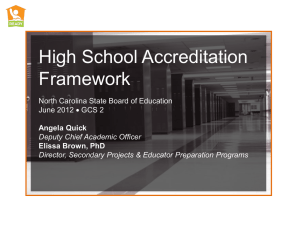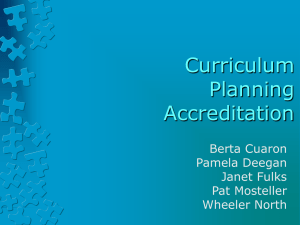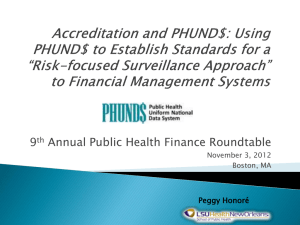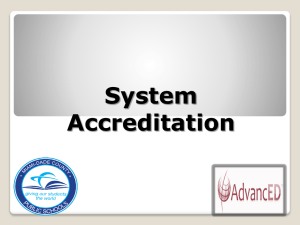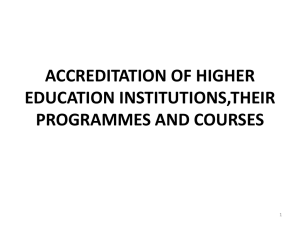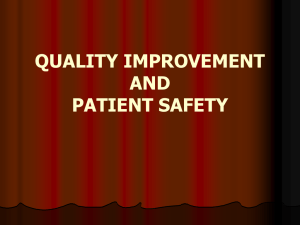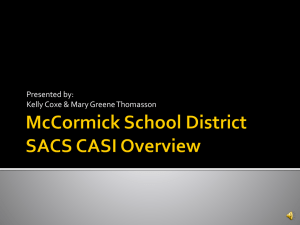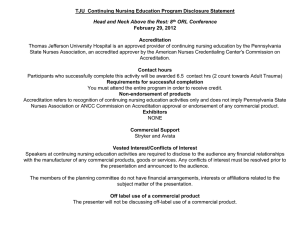Faculty PowerPoint
advertisement
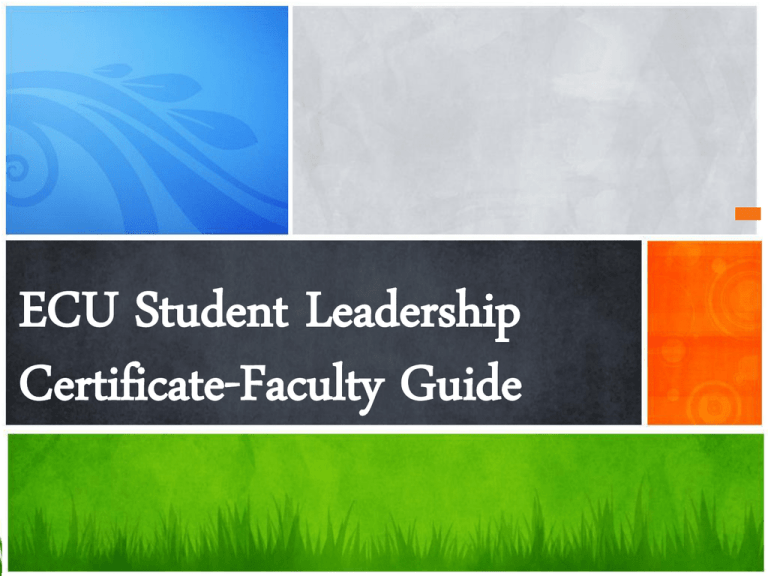
Think the unthinkable to spark transformation ECU Student Leadership Certificate-Faculty Guide Developmental Readiness ABILITY TO DEVELOP + MOTIVATION TO DEVELOP = Stage 3 Stage 4 Stage 5 Stage 6 Independent Dependent and dependent Stage 2 Interdependent Stage 1 Awareness: Recognition that there are such people as leaders Exploration/Engagement: A time of experiencing groups Leader Identified: Leader-centric; leaders and followers exist Leadership Differentiated: Differentiate leadership beyond the formal role of the leader Generativity: Becoming actively committed to larger purposes Integration/Synthesis: Continuous active engagement with leadership on a daily basis Relational Leadership Model Knowing you must know—yourself, how change occurs, and how others view things differently than you Being You must be—ethical, principled, open, caring and inclusive Doing You must act—in socially responsible ways Kolb’s Learning Cycle BREAKING DOWN THEORY Leadership Identity Development Model Based ECU’s Enduring Values … RESPECT AUTHENTICITY ACCOUNTABILITY • • TEAMWORK COMMITMENT TO SERVE Leadership is a relational process of inspiring, empowering and influencing positive change. ECU’s Integrated Leadership Framework Knowledge: Life-long learner Relationships: Mentorship Ethics: Character Catalyst Well-Being: Healthy Individual Service: Positive Change Agent ECU’S INTEGRATED LEADERSHIP FRAMEWORK • • • Framed by ECU’s Leadership Definition How ECU Currently Provides Leadership Education: Develop Leadership Program (curricular and/or cocurricular) Develop Leadership Program (curricular and/or cocurricular) Student Participation Internal Assessment Student Participation Internal Assessment Linear and lacks connectivity The purpose in undertaking this study was twofold: to create a set of leadership competencies and measurements based on research that scholars and practitioners could use as learning outcomes for curricular and co-curricular leadership programs and to use these competencies to translate learning outcomes from 522 academic programs within 98 academic accrediting organizations to serve as a common language of leadership 475 Accrediting Agencies, 522 Academic Programs, 17,577 Learning Outcomes, 240 Measurements Learning & Reasoning Research Other perspectives Reflection and application Systems thinking Analysis Synthesis Evaluation Problem solving Decision making Developing original ideas Self-awareness & development Self-understanding Personal values Personal contributions Scope of personal competencies Feedback from others Developing competencies Interpersonal Interaction Civic Responsibility Healthy relationships Diversity Appropriate interaction Others’ circumstances Helping others Social justice Others’ contributions Inclusion Empathy Social responsibility Supervision Community Providing feedback development Mentoring Empowerment Group Dynamics Motivation Organizational behavior Collaboration Power dynamics Group development Creating change Strategic Planning Mission Vision Goals Plan Organization Time management Communication Oral communication Nonverbal communication Listening Writing Facilitation Conflict negotiation Articulating a point of view Personal Behavior Ethics Resiliency Responding to change Responding to ambiguity Functioning independently Initiative Follow through Responsibility for personal behavior Positive attitude Confidence Excellence • • • • • • • • • • • • • • • • • • • • • • • • • • • • • • • AABI Aviation Accreditation Board International AACSB The Association to Advance Collegiate Schools of Business AAFCS American Association of Family and Consumer Sciences AAFS American Academy of Forensic Sciences AAHPERD-AAHE American Association of Health Education AAHPERD-NASPE National Association for Sport & Physical Education AAMFT American Association for Marriage and Family Therapy AANP American Association of Nurse Practitioners ABA American Bar Association ABAP The American Board for Accreditation in Psychoanalysis, Inc. ABET Applied Science, Computing, Engineering, and Technology ABFSE American Board of Funeral Service Education Committee on Accreditation ACAE Accreditation Commission for Audiology Education ACAOM Accreditation Commission for Acupuncture and Oriental Medicine ACBSP Accreditation Council for Business Schools and Programs ACCE American Council for Construction Education ACEI Association for Childhood Education International ACEJMC Accrediting Council on Education in Journalism and Mass Communications ACFEF American Culinary Federation’s Education Foundation ACME Accreditation Commission for Midwifery Education ACPE Accreditation Council for Pharmacy Education ACPE Association for Clinical Pastoral Education ACTFL American Council on the Teaching of Foreign Languages ADA American Dental Association AECT Association for Educational Communications and Technology ALA American Library Association Committee on Accreditation ALA/AASL American Association of School Librarians AMLE Association for Middle Level Education AOA American Optometric Association AOA American Osteopathic Association AOTA American Occupational Therapy Association • • • • • • • • • • • • • • • • • • • • • • • • • • • • • • • • • • APA American Psychological Association APMA American Podiatric Medical Association APsaA American Psychoanalytic Association APTA American Physical Therapy Association ARC-PA Accreditation Review Commission on Education for the Physician Assistant, Inc. ASHA American Speech-Language-Hearing Association ASHP American Society of Health-System Pharmacists ASLA American Society of Landscape Architects ATMAE Association of Technology, Management, and Applied Engineering ATS Association of Theological Schools AVMA American Veterinary Medical Association CAAHEP Commission on Accreditation of Allied Health Education Programs CAATE Commission on Accreditation of Athletic Training Education CACREP Council for Accreditation of Counseling and Related Educational Programs CADE-ADA American Dietetic Association Commission on Accreditation for Dietetics Education CAHIIM Commission on Accreditation for Health Informatics and Information Management CAHME Commission on Accreditation of Healthcare Management Education CCE Council on Chiropractic Education CCIE Commission on Collegiate Interpreter Education CCNE Commission on Collegiate Nursing Education CEC Council for Exceptional Children CEPH Council on Education for Public Health CIDA Council for Interior Design Accreditation CNME Council on Naturopathic Medical Education COA Commission on Opticianry Accreditation COA-NA Council on Accreditation of Nurse Anesthesia Educational Programs COAPRT National Recreation and Park Association Council on Accreditation of Parks, Recreation, Tourism, and Related Professions CoARC Commission on Accreditation for Respiratory Care COCA Commission on Osteopathic College Accreditation COMTA Commission on Massage Therapy Accreditation CORE Council on Rehabilitation Education CSWE Council on Social Work Education EHAC National Environmental Health Science & Protection Accreditation Council • • • • • • • • • • • • • • • • • • • • • • • • • • • • • • • • • ELCC Educational Leadership Constituent Council GAC Global Accreditation Center IACBE International Assembly for Collegiate Business Education IFSAC-DA International Fire Service Accreditation Congress Degree Assembly IRA International Reading Association ISTE International Society for Technology in Education ITEA-CTTE International Technology and Engineering Educators Association JRCERT Joint Review Committee on Education Programs in Radiologic Technology JRCNMT Joint Review Committee on Educational Programs in Nuclear Medicine Technology LCME Liaison Committee on Medical Education MEAC Midwifery Education Accreditation Council NAACLS National Accrediting Agency for Clinical Laboratory Sciences NAAEE North American Association for Environmental Education NAEYC National Association for the Education of Young Children NAGC National Association for Gifted Children NASAD National Association of Schools of Arts and Design NASD National Association of Schools of Dance NASM National Association of Schools of Music NASP National Association of School Psychologists NASPAA National Association of Schools of Public Affairs and Administration NAST National Association of Schools of Theater NCACE National Council for Accreditation of Coaching Education NCATE National Council for Accreditation of Teacher Education NCSS National Council for the Social Studies NCTE National Council of Teachers of English NCTM National Council of Teachers of Mathematics NLNAC National League for Nursing Accrediting Commission, Inc. NSTA National Science Teachers Association PAB Planning Accreditation Board PCSAS Psycholocial Clinical Science Accreditation System SAF Society of American Foresters TEAC Teacher Education Accreditation Council, Inc. TESOL Teachers of English to Speakers of Other Languages UNIVERSITY OF ARIZONA SLC Accrediting Academic Organizations How ECU Currently Provides Leadership Education: Develop Leadership Program (curricular and/or cocurricular) Develop Leadership Program (curricular and/or cocurricular) Student Participation Internal Assessment Student Participation Internal Assessment Linear and lacks connectivity Proposed Competency Based Certificate Model Model of Multiple Dimensions of Identity ECU’s Leadership Certificate-A Competency Based Model Requirements: • Collaborative Spirit • Open and Honest Dialogue • Clear and Consistent Expectations • Flexibility • Innovative Mindset • Emphasis on Student Leadership Learning Students’ Leader (self)-development (LSD) behaviors: SEEKING AND ENGAGING IN STRETCH ASSIGNMENTS/TRIGGERS SELF-REFLECTION AND SELF-AWARENESS LEARNING FROM OTHERS The individual process of LSD does not occur alone; rather relies on an entire system including program culture and norms, internal processes and available resources Leader Development Models Individual (me) Intermediate Expert Relational (you and me) Collective (us) Hall and Lord (2005) Model Competency Definition: Fundamental knowledge, attitude, or skill in a specific subject area Benefits » Capacity to measure success » Creates platform for feedback and training » Promotes learning and growth » Provides common language Drawbacks » Any competency model can include bias in either creation and/or application » Can lead someone to believe that just b/c they attend a session on a competency that they have indeed mastered it » Short list of competencies: useful/not comprehensive; long list: more comprehensive/harder to put into practice 4 Dimensions of a Competency: Knowledge=Understanding Value=Attitude Ability=Skill or Motivation Behavior=Action Goals of ECU Leadership Certificate Track student leadership experiences Measure student leadership learning Connect ECU leadership experiences throughout the University Increase student ability to articulate their understanding of leadership Increase student/graduate likelihood to create positive sustainable change Foster an environment of dynamic leadership learning Create a language of leadership throughout the University Career Connection According to the 2012 employer survey conducted by the National Association of Colleges and Employers (NACE), employers believe the most important competencies of an employee are the ability to work in a team structure; verbally communicate with persons inside and outside the organization; make decisions and solve problems; obtain and process information; and plan, organize, and prioritize work. Employers want graduates who have learned to think critically, manage their time, and create meaningful connections with others (NACE, 2012). ECU Student Leadership Competency Matrix LID Stage 3: Leader Identified Explore LID Stage 4: Leader Differentiated Envision LID Stage 5: Generativity Knowledge: • Organization • Goals • Motivation • Idea generation • Vision • Research • Reflection & Application • Other’s Contributions • Responding to Ambiguity • Synthesis • Scope of Competence • Analysis • Appropriate Interactions • Verbal Communication • Non Verbal Communication • Receiving Feedback • Mission • Writing • Providing feedback • Group Development • Empathy • Mentoring • Supervision • Facilitation • Decision Making • Personal Values • Personal Contributions • Evaluation • Problem Solving • Conflict Negotiation • Ethics • Social Justice • Helping Others • Organization Behavior • Systems Thinker • Responding to change • Positive Attitude • Initiative • Self-Understanding • Confidence • Plan • Follow Through • Inclusion • Responsibility to personal behavior • Self-Development • Resiliency • Excellence • Functioning Independently • Others’ Circumstances • Listening • Productive Relationships • Advocating a point of view • Diversity • Others’ Perspectives • Empowerment • Collaboration • Service • Creating change • Social Responsibility • Power Dynamics lifelong long learner Relationships Mentor Ethics Character Catalyst Well-Being Healthy Individual Service Positive Change Agent Influence LID Stage 6: Integration/ Synthesis Integrate ECU STUDENT LEADERSHIP COMPETENCIES ECU Leadership Certificate Competency Matrix Faculty LC Experience Develop Leadership Program or Course Submit form to be reviewed by committee Compare Learning Outcomes to Competency List Upload to Annual Report Etc. Receive Assessment Results from Participants Teach Course or Program Upload Roster Submitting Programs All programs will be submitted via an online portal (Qualtrics) Page 1 of Form: Program/Course logistics, Learning Outcomes, Place to upload syllabus, etc. Page 2 of Form: Competency Selection** Page 3 of Form: Narrowing competency KVAB Page 4 of Form: Final Review and Submission to Review Board The Review Process Once a program has been submitted it will be assigned to a Leadership Certificate Team Member Team Member will use a rubric to review and confirm that all details of the program are acceptable Notification of review will be sent to facilitator from CSLE asking for clarification or confirming participation and providing a customized Rubric If a program needs further clarification, an email will be sent or a meeting will be set up to discuss issues At the end of each semester a review of the programs in L.C. will be updated, removed etc. Student Experience Explore Navigating the LC Workshop Completion of Competency Based Programs Reflective Artifact Influence Civic Engagement Workshop Completion of Competency Based Programs Completion of PreApproved Service Hours Reflective Artifact Essays or Video Envision Vision Development Workshop Completion of Competency Based Programs Reflective Artifact Essays or Video Integrate Essays or Video Career and Leadership Workshop Completion of Competency Based Programs Reflective Artifact Essays or Video Final Portfolio Assessment Example Possesses an understanding of motivation KNOWLEDGE 1. Participating in _____ did not increase my understanding of motivation. 2. Participating in _____ slightly increased my understanding of motivation. 3. Participating in _____ moderately increased understanding of motivation. 4. Participating in _____ greatly increased understanding of motivation. Possesses and awareness of Self Value 1. Participating in _____ did not increase the value I place on my own motivation. 2. Participating in _____ slightly increased the value I place on my own motivation. 3. Participating in _____ moderately increased the value I place on my own motivation. 4. Participating in _____ greatly increased the value I place on my own motivation. Future Assessment Strategies Student Leadership Competencies Indicator (Self Report Tool) 360 Evaluations Rubrics Focus Groups Interviews “Who we become together will always be different than who we were alone. Our range of creative expression increases as we join with others. New relationships create new capacities.” Margaret Wheatley and Myron Kellner-Rogers Overall Benefits • • • • • • • • • • Assessment Results Directly Related to Accreditation & ECU Integrated Leadership Framework Consistent Assessment Measures Minimal Additional Time Commitment Reduced Duplication of Effort Provides Leadership Standards and Easy Training for New Faculty Benchmarking Across the University Free Advertising Acknowledgement of Participation Retention Reports Alumni Reports “Who we become together will always be different than who we were alone. Our range of creative expression increases as we join with others. New relationships create new capacities.” Margaret Wheatley and Myron Kellner-Rogers
